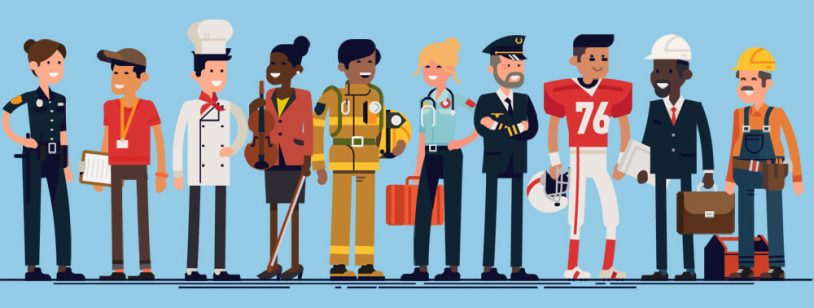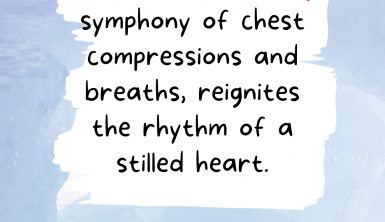CPR certification is incredibly beneficial for anyone who has to interact with other people, since emergencies can happen at any time. While a few careers may require CPR training – this includes emergency responders, childcare workers, and other careers where handling medical situations may be necessary – many careers do not explicitly require CPR certification.
But because there is not generally much warning that a cardiac emergency is going to happen, even people who don’t necessarily expect to need to perform CPR as part of their job duties will find that there is no downside to CPR certification – and it may lead to saving someone’s life.
Below are 15 careers where CPR certification is beneficial, even if it is not explicitly required by an employer.
Medical careers
If you’re pursuing or looking to pursue a career in any sort of medical field, CPR certification is a must-have. In a part of the medical field where you’re responsible for directly interacting with patients, like a doctor or nurse, you’ll be the first person that bystanders look to if someone needs CPR.
But CPR training is essential even for people who don’t work on the front lines in the medical profession. Bystanders will expect that those who are even somewhat connected to the medical field – in an administrative role, for example – will still be trained and able to correctly perform CPR at a moment’s notice. In any medical career, CPR is a must-have.
Law enforcement
Law enforcement officers are often the first to respond to an incident and are responsible for safely handling a wide array of situations. While the police do sometimes catch high-profile burglars, murderers and other criminals, much of the day to day work of a police officer involves handling far more ordinary situations.
A police officer might be summoned to handle a distress call directly relating to a cardiac incident, or a cardiac incident might simply occur nearby a police officer. Whatever the situation is, a police officer’s job is to protect the public they serve. For this reason, knowing CPR is an absolute must for anyone in a law enforcement position.
Childcare providers
Childcare providers are responsible for all facets of a child’s well being. They watch children when their parents are away, but they do so much more than that. Childcare providers aid children with their education, provide them enrichment activities, facilitate social bonding and so much more.
Childcare providers need CPR training because they must be prepared to handle sudden emergencies correctly. Due to children’s small stature, the method of performing CPR on young people is different than that of adults. Childcare providers must stay up to date on their CPR certification, in order to ensure that they can protect the safety of the children they care for.
Coaches and athletic trainers
In any exercise situation, the heart plays a major role. Cardiovascular fitness is an important component to an all-around fitness regimen. Coaches and athletic trainers work to help their clients improve and maintain their level of personal fitness.
While coaches and athletic trainers aren’t doctors, they are responsible for their clients’ well-being, and they must be prepared in the case of injury or emergency. If a client or athlete pulls a muscle, sprains their ankle, or suffers other harm, a coach or athletic trainer needs to know what to do in that situation. By the same token, they must be able to perform CPR in the case of an emergency, while they wait for an ambulance to arrive.
Jail and prison personnel
Jail and prison personnel are responsible for more than inmate security. Due to the security involved in prisons, it can often take significantly longer for outside medical personnel to respond. Jail and prison personnel must know CPR so that they can respond to an incident immediately.
When someone has a heart attack or another cardiac event that requires CPR, every second is vital. The time lost while outside medical personnel are cleared to enter the prison cannot be wasted; people who work at the jail or prison need to know lifesaving intervention techniques. They are responsible not only for guarding the safety of the public at large through the operation of the prison, but also for the safety of the prisoners inside, and, as such, must be able to quickly respond.
Lifeguards
Many people look back fondly on their days at the beach or the community pool in the summer. However, swimming is also a dangerous activity. Numerous people die every year due to drowning, heatstroke, dehydration, and other causes. While some of these deaths are unavoidable, it’s a lifeguard’s job to swim out and rescue anyone struggling in the water, and it’s also their job to provide immediate medical care as soon as they reach land.
Lifeguards need to be trained on CPR and other lifesaving medical interventions because there is often a long distance between the road or parking lot and the actual location someone needs medical attention. This can involve a trek across sand, which slows movement. Furthermore, lifeguards interact with hundreds of diverse people each day, with all different physical and medical needs, and so they need to be prepared for the unexpected.
Firefighters
Firefighters don’t just put out fires, they also care for the people immediately affected by them. If a firefighter rescues someone from a burning building, that firefighter must be trained to perform lifesaving medical treatment if necessary. The risk of personal injury after a fire is extremely high, and, therefore, so is the need for medical care.
A firefighter often needs to act as a medic, as well as a firefighter. While ambulances often show up at the same time as a firetruck, in the event of a delay, treatment for cardiac arrest cannot wait. It’s imperative that all firefighters be first aid and CPR certified so that they can protect the public they serve.
Flight attendants
While in the air, it’s impossible to call for trained medical personnel, and no one wants to gamble on whether there might be a doctor on the flight. Flight attendants do far more than just serve drinks and snacks – they’re highly trained aviation professionals who know what to do in a wide array of emergencies. From drunk and disorderly passengers to serious medical emergencies, flight attendants are the people responsible for caring for passengers.
In the event of a serious emergency, flights are usually able to divert and land at the nearest airport. However, with flights stretching across the ocean, it might still be several hours before it would be possible to make an early landing. For this reason, flight attendants must be CPR certified, in order to ensure that passengers have the best possible medical outcome once they reach the ground.
Nannies and babysitters
The word ‘babysitter’ often conjures up an image of a pre-teen from down the street, while the word ‘nanny’ often implies an older, paraprofessional childcare worker. However, whether you’re watching the kids down the block or have had a decades-long career in childcare, both nannies and babysitters must know the ins and outs of CPR for all ages.
Nannies and babysitters are the first line of defense for anything that might happen to the child in their care, and so they must be prepared for any sort of emergency. Knowing CPR and basic first aid will allay a parent’s fear about being absent, and it will also equip nannies and babysitters to provide lifesaving intervention before medical professionals arrive.
Teachers and school staff
Teachers and other school staff interact with hundreds of children and teenagers per day. While things generally go to plan, they must always be prepared for unexpected situations. Knowing CPR and basic first aid is vital for anyone who deals with large numbers of the public, but especially in a school setting.
Some schools do have nurses on staff who would be able to provide CPR, but not all schools do. Teachers and school staff need to be ready for any emergency that might happen. They are responsible for more than just education; they also care for their students’ well-being during the school day. An emergency can happen at any time and in any place, so teachers and other school staff must be CPR certified.
Counselors
While psychiatric counselors are not the same sort of medical professional as doctors, nurses or surgeons, they do deal with medical issues. It’s important that counselors be CPR certified, as it gives patients confidence that they will be in safe hands and allows the counselor the knowledge and capability to intervene in crises.
Because you can never expect when a cardiac event will strike, it’s vital for all sorts of medical professionals, including psychiatric professionals, to be prepared.
Security guards
Security guards interact with the public every day. Statistically, the more people a person interacts with, the greater the likelihood that there will be a dangerous situation they need to intervene in. As someone who works with the public, a security guard must be able to perform CPR when necessary.
CPR certification is beneficial to security guards for a similar reason that it is beneficial to police. Because security guards often wear uniforms that identify them as authority figures, they are likely to be called into situations that need intervention – whether these situations be medical or otherwise. For a security guard, as with anyone else, knowing how to perform CPR could be a lifesaving piece of knowledge.
Parents
Parents are responsible for the safety and well-being of their children at all times, and yet comparatively few parents are medical professionals. You certainly don’t need to be a medical professional to be a parent, but you do need to know enough first aid to make the right call in an emergency situation.
When it comes to cardiac arrest, seconds are vital. If a parent knows CPR, that could be the difference between their child living and their child dying. This is especially true because there are different techniques for CPR, which depend on the age of the recipient. Knowing how to correctly perform this lifesaving procedure is an absolute necessity for any parent.
Social workers
As professionals who are employed to help people, knowledge of first aid and CPR techniques is a must-have for social workers. They encounter many different people in many different situations and need to be prepared for whatever comes their way. This includes being able to provide lifesaving intervention treatment, if necessary.
Personal trainers and physical therapists
Personal trainers and physical therapists work with patients in a combined athletic and medical capacity. Because their work deals with the body and with health, CPR certification is a must. It’s impossible to know when an emergency situation will occur, and it would not be becoming for a personal trainer or physical therapist to have to run and leave the room to get aid if one of their clients had a cardiac event – or, worse, to stand idly by after having called for emergency services.
For personal trainers and physical therapists, knowing how to provide lifesaving medical intervention in the case of an emergency is vital to being successful.
Conclusion
If you have a job that requires you to interact with the public, CPR certification is a must-have. There’s no way of telling when an emergency could occur and, in situations like these, every minute counts. Being prepared to administer CPR if an emergency happens at your place of work, even if it is unexpected, makes you a valuable employee and citizen.







